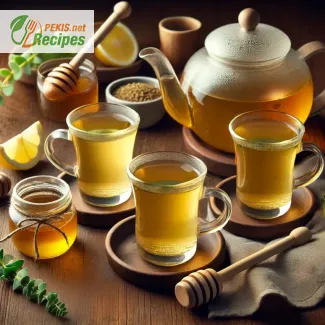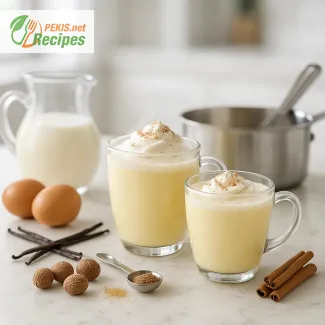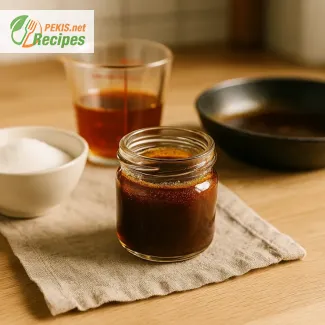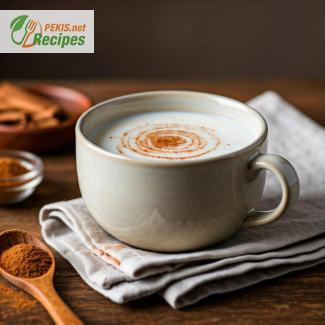
Natural Eucalyptus and Thyme Cough Tea is a soothing remedy that combines the power of natural ingredients to provide relief during the colder months. This warm and comforting tea is not just a drink; it’s a wellness ritual crafted to ease your throat, clear your sinuses, and boost your immune system. Whether you’re battling a seasonal cold or simply looking for a calming beverage, this recipe is an excellent choice for anyone seeking a holistic approach to health.
At the heart of this tea are eucalyptus leaves and thyme, two well-known botanicals with exceptional health benefits. Eucalyptus is prized for its ability to clear airways, soothe a sore throat, and act as a natural decongestant. Its refreshing aroma also helps to relax the mind and body. Meanwhile, thyme, a common herb in both culinary and medicinal applications, is rich in antioxidants and antimicrobial properties, making it a natural ally against colds, coughs, and respiratory discomfort.
The preparation of this tea is designed to maximize the medicinal qualities of its ingredients while maintaining an enjoyable flavor. The subtle sweetness from natural honey balances the earthy notes of the eucalyptus and thyme, creating a harmonious blend that soothes the senses. A hint of lemon juice not only enhances the taste but also adds a burst of vitamin C, giving your immune system the extra support it needs.
Crafting this tea is a simple yet rewarding process. With just a few ingredients and a little time, you can prepare a beverage that is both therapeutic and delicious. The combination of hot water, dried eucalyptus leaves, fresh thyme, honey, and lemon juice creates a rich, aromatic infusion that will quickly become your go-to remedy for those chilly evenings or moments when you’re feeling under the weather.
This recipe is not only effective but also entirely natural, free from artificial additives or preservatives. It aligns with the growing trend toward natural remedies and homemade wellness solutions, giving you control over what you consume and the confidence that every sip supports your health. By choosing this tea, you’re embracing a tradition of natural healing methods that have been cherished for centuries.
What makes this tea truly special is its versatility. While it’s primarily crafted to alleviate coughs and congestion, it can also be enjoyed as a preventive measure or a comforting drink during moments of stress or fatigue. The gentle warmth and fragrant aroma create a calming effect, helping you to unwind after a long day.
Beyond its immediate benefits, this tea also provides essential nutrients. It’s rich in antioxidants that combat free radicals, vitamins that support your overall well-being, and minerals that contribute to better health. The inclusion of thyme and eucalyptus in your diet, even in the form of tea, can promote long-term respiratory and immune health.
Perfect for the entire family, this tea can be easily adapted to suit different preferences. Adjust the sweetness by adding more or less honey, or experiment with other herbs such as mint or sage for a personalized touch. Its all-natural composition also makes it a safe option for those looking to reduce their reliance on over-the-counter remedies.
Whether you’re sipping it as a daily tonic or reaching for it during times of illness, this Natural Eucalyptus and Thyme Cough Tea is an easy and effective way to take care of yourself and your loved ones. Embrace the healing power of nature with every cup and experience the comfort and relief this traditional remedy has to offer.
- Prepare the ingredients:
- Measure the water, eucalyptus leaves, and thyme.
- Squeeze the lemon juice and set it aside.
- Boil the water:
- Pour 500 ml (2 cups) of water into a saucepan and bring it to a boil.
- Add the herbs:
- Once boiling, reduce the heat to a simmer and add the eucalyptus leaves and fresh thyme sprigs.
- Simmer:
- Let the mixture simmer for about 5–7 minutes to allow the herbs to infuse into the water.
- Strain the tea:
- Remove the saucepan from heat. Use a fine mesh strainer to strain the tea into a teapot or serving cups.
- Add honey and lemon:
- Stir in the honey and lemon juice while the tea is still warm.
- Serve:
- Pour the tea into cups and enjoy while hot.
Enhancing and Personalizing the Natural Eucalyptus and Thyme Cough Tea Recipe
The Natural Eucalyptus and Thyme Cough Tea is a simple yet highly customizable recipe. While its primary goal is to soothe coughs and improve respiratory health, you can make several adjustments to tailor the recipe to your taste preferences, dietary needs, or additional wellness goals. Below, we delve into how each ingredient can be modified, what substitutions work best, and how these changes affect flavor and benefits.
Substituting Ingredients for Taste and Health Benefits
Adjusting the Sweetener
- Honey is a natural sweetener that enhances the tea’s soothing properties. However, it can be replaced or modified based on your needs:
- Maple syrup: A slightly richer, caramel-like sweetness that pairs well with the earthy flavor of thyme.
- Agave nectar: A milder sweetness that’s suitable for those seeking a lighter taste or a vegan-friendly option.
- Stevia: For a sugar-free alternative, stevia provides sweetness without the calories, but it may leave a faint aftertaste.
Modifying the Herbal Base
- Eucalyptus leaves are central to this recipe for their decongestant and calming properties. However, they can be complemented or substituted:
- Peppermint leaves: Add a refreshing minty flavor while maintaining respiratory benefits.
- Chamomile flowers: Create a gentler, more floral infusion, ideal for evening consumption to promote relaxation.
- Thyme provides its distinctive earthy and slightly peppery flavor, but it can be swapped for other herbs:
- Sage leaves: Imparts a more robust and savory note while retaining antimicrobial benefits.
- Lemongrass: Offers a citrusy, bright flavor that balances the eucalyptus’s intensity.
Adding Complexity to the Flavor
Introducing Citrus Variations
- While lemon juice provides a burst of tanginess and vitamin C, you can explore other citrus options:
- Orange juice: Adds a sweeter citrus profile, making the tea more palatable for children.
- Grapefruit juice: Introduces a slightly bitter edge, which pairs well with the eucalyptus aroma.
Spicing Things Up
- Though this recipe intentionally excludes spices like cinnamon, you can enhance its warmth and depth by experimenting with subtle additions:
- Fresh ginger: Infuse thin slices into the simmering tea for a spicy kick that also aids digestion.
- Clove: Adds a hint of spice while amplifying the antimicrobial properties.
Adjusting the Strength of the Tea
Concentration of Herbs
- Stronger flavor: Increase the quantity of eucalyptus leaves and thyme for a bolder, more potent infusion. This is particularly effective if you’re battling severe congestion.
- Milder flavor: Reduce the amount of herbs or steep them for a shorter period to create a lighter, more refreshing tea suitable for daily enjoyment.
Brewing Techniques
- Cold-brewing: Prepare the tea by steeping the ingredients in cold water overnight in the refrigerator. This results in a smoother, less intense flavor, perfect for warmer months.
- Double steeping: After straining the tea, reuse the herbs for a second, weaker infusion to maximize the use of ingredients.
Adjusting for Dietary Preferences and Allergies
Honey Alternatives for Vegan or Allergy-Friendly Options
- Replace honey with coconut sugar, brown rice syrup, or molasses to maintain the tea’s natural sweetness while catering to dietary restrictions.
Gluten Concerns
- This recipe is naturally gluten-free. However, ensure that any packaged herbs or sweeteners used are certified gluten-free to avoid cross-contamination.
Amplifying the Health Benefits
Adding Boosters
- Turmeric: Stir in a pinch for anti-inflammatory properties and a subtle earthy undertone. Pair it with black pepper to enhance absorption.
- Echinacea: Brew with the other herbs for an immune-boosting effect during flu season.
Increasing Antioxidants
- Incorporate a small amount of green tea or rooibos tea to enhance antioxidant levels while complementing the tea’s herbal notes.
How These Changes Affect the Flavor
Balancing Sweetness and Earthiness
- Replacing honey with agave nectar or maple syrup can result in a less floral and more caramel-like sweetness. Conversely, using stevia keeps the tea light but may alter its aftertaste.
Highlighting Citrus or Herbal Notes
- Adding citrus variations like orange juice can make the tea brighter and more refreshing, while sage or peppermint deepen its herbal profile, making it ideal for winter evenings.
Elevating Spiciness or Warmth
- The inclusion of ginger or clove introduces a layer of warmth and complexity that pairs beautifully with the eucalyptus’s cooling effect.
Customizing for Children or Sensitive Palates
- Reduce eucalyptus leaves: Children may find eucalyptus too intense, so lowering its amount or pairing it with milder herbs like chamomile can make the tea more appealing.
- Increase sweetness: Add a touch more honey or natural sweeteners to cater to sweeter preferences.
Tips for Presentation and Serving
- Decorative garnish: Float a sprig of thyme or a thin lemon slice on the surface of the tea for an elegant touch.
- Serving warm or cold: This tea can be served warm for soothing colds or chilled over ice for a refreshing summer drink.
By experimenting with these substitutions and adjustments, you can create a tea that is uniquely yours while still reaping its therapeutic benefits. These changes not only allow for personalization but also open doors to new flavor profiles and health enhancements. Let this recipe inspire you to explore the possibilities of natural remedies in your kitchen!
- No common allergens or gluten present in this recipe.
- Substitutions: For those allergic to honey, replace it with maple syrup or agave nectar.
- Vitamin C: 5 mg – Supports the immune system and promotes healthy skin.
- Calcium: 10 mg – Essential for bone health.
- Potassium: 25 mg – Helps regulate blood pressure.
- Eucalyptus leaves: High in flavonoids, promoting respiratory health and reducing inflammation.
- Thyme: Rich in thymol, a powerful antioxidant that supports the immune system.
- Honey: Contains polyphenols, which help combat oxidative stress.
Enjoy this warm, natural tea as a comforting remedy for coughs and colds or as a preventive wellness drink.





